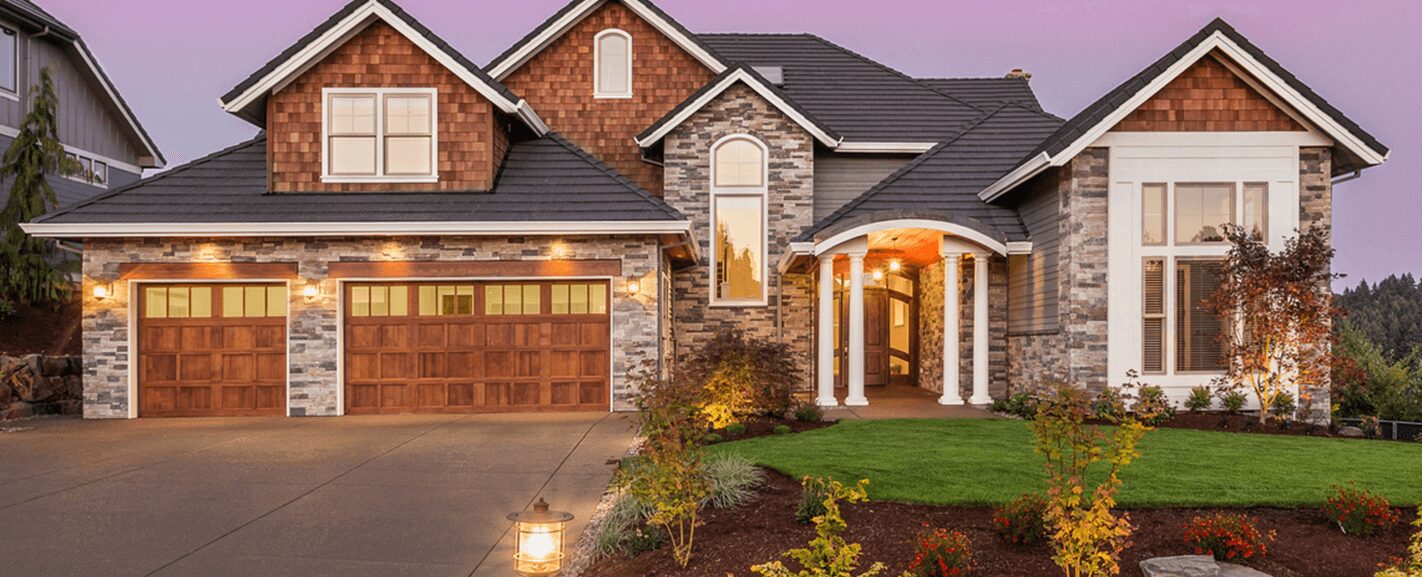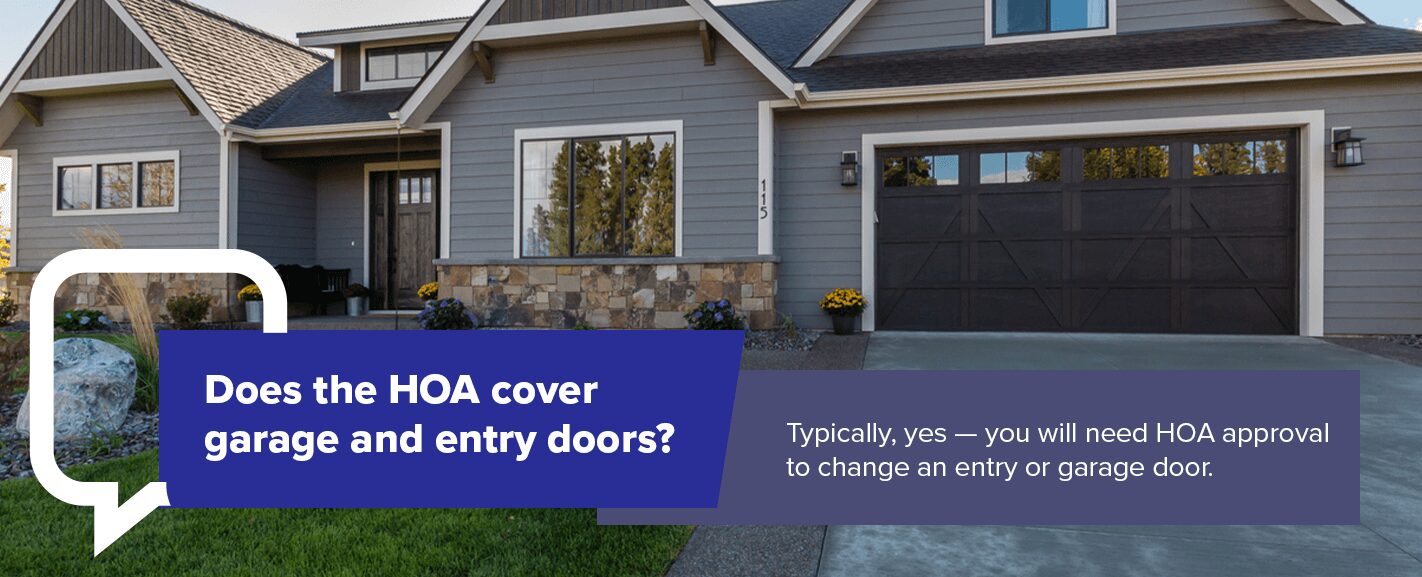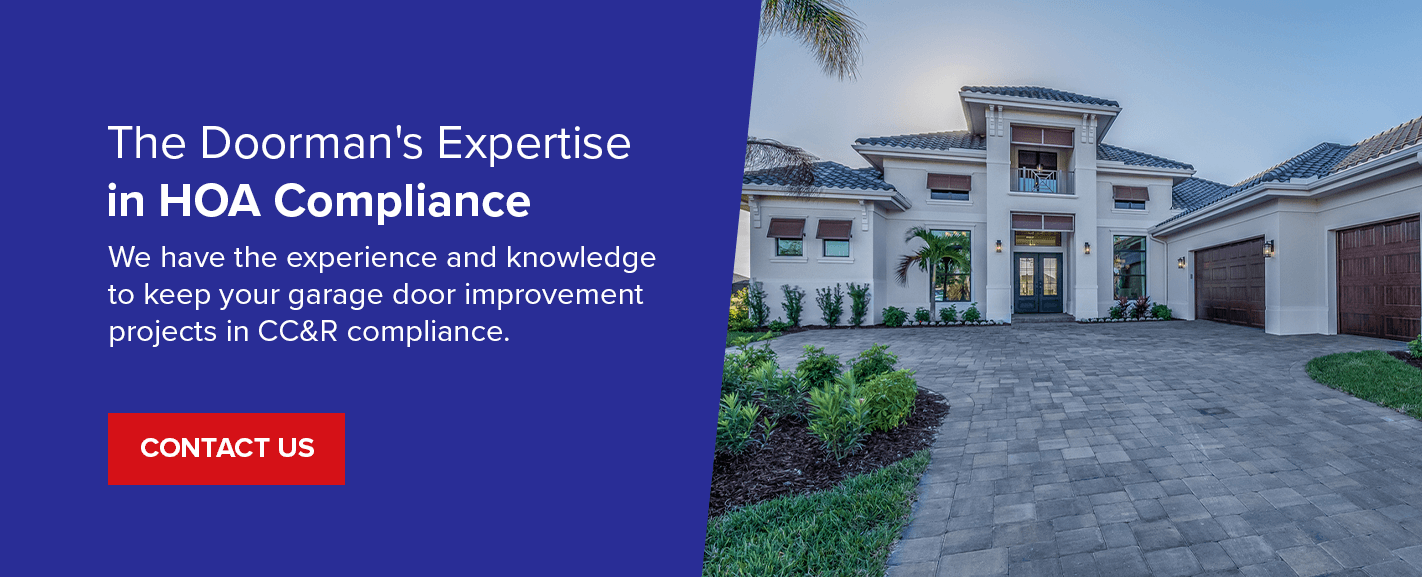Adding additions or making upgrades to your property increases its appeal and value. Homeowners associations (HOAs) apply to a large number of Southeast Florida community codes, and some new projects for your home or condo will need their approval. Projects requiring HOA approval in Florida are primarily changes or alterations to the outside of your home, including garage and entry doors.
What Is a Homeowners Association?
The purpose of an HOA is to set guidelines pertaining to the rate of growth, positively control the marketability and value of homes and improve the overall standard of living for the community. To facilitate their objectives, HOAs create bylaws and Covenants, Conditions and Restrictions (CC&Rs). These laws are similar to borough codes and ordinances in that they are statutory laws enacted by a smaller governmental committee.
Like ordinances, they dictate what is allowed to be done on your property and when. Because they restrict your ability to start a renovation whenever you want, they can hamper future plans if you don’t gain prior approval. Remember, CC&Rs are put in place so that your quality of life is improved and property values remain high.
By following your HOA’s CC&Rs, you can expedite your approval process. If you neglect to follow the legally binding CC&Rs, your HOA could give you notice, fine you or even take legal action.
The Legal Authority of HOAs
HOAs are governed by state law and enforce their own set of rules by way of the CC&Rs. These rules and bylaws are enforceable in a Florida court between the association and homeowners. HOAs have a legal authority to uphold community standards and property management for the good of all homeowners within the specific neighborhood.
State Laws Governing Florida HOAs
The HOAs in Florida are governed by Chapter 720 of the Florida Statutes, also known as the Florida Homeowners’ Association Act. The act sets out the roles of HOAs and homeowners and provides guidelines on association elections, finance management, meetings and more. It also outlines each party’s rights and responsibilities, ensuring a fair and transparent relationship.
The Contractual Relationship Between Homeowners and Associations
By purchasing a home within an HOA, you agree to abide by its rules and regulations. These rules are within the CC&Rs, and homeowners are contractually obliged to be familiar with and follow the ordinances. Some examples include signage restrictions, managing structural modifications and maintaining property appearance.
Enforcement Mechanisms for CC&Rs
HOAs have several enforcement mechanisms when homeowners fail to adhere to certain bylaws, which include:
- Issuing violations: A notice of initial violation is typically the first step an HOA will take. It is the HOA’s duty to outline the violation, allowing homeowners to address any noncompliance.
- Collecting fines: Homeowners may have to pay a fine, with the amount varying based on the nature and duration of noncompliance.
- Pursuing legal action: Where a case is severe, the HOA has the right to take legal action against a homeowner.
The Benefits of Compliance With Regulations
Your home is your investment, and complying with your association’s regulations holds benefits for you and your neighborhood. These include:
- Enhancing the attraction of the area
- Boosting home value
- Preserving community harmony
- Maintaining access to community amenities, if applicable
- Predictability when planning projects
Let’s take a look at the various projects that typically do and don’t require HOA approval so you can plan your project accordingly and do it right the first time.
Projects That Don’t Require HOA Approval
HOA restrictions don’t apply to every project. Generally, HOA rules apply to the exterior of your home, such as the color of your garage doors or the composition of your fence. For condo owners, they apply to what is known as common property. Renovations on individual property are outside the scope of CC&Rs and can reasonably be done without approval from your HOA.
Examples of individual property include carpeting, kitchen cabinets, sink basins and toilets (but not the attached plumbing), paint and other superficial coverings. Since CC&Rs differ by HOA, it’s important to familiarize yourself with yours before starting a project to ensure you don’t face consequences.
Projects that don’t require HOA approval typically include:
- Interior paint and wallpaper
- Changes to trim or moldings
- Replacing a sink or bathtub
- Changing light fixtures, light switches or outlets
- New carpeting
- Adding a lawn to your backyard
Projects That Do Require HOA Approval
Larger, more involved projects may require you to get approval from your HOA. An HOA can prevent you from updating your home if your project does not follow their rules or is set to be done by companies of dubious ethics.
If you live in a condo, projects done on common property require approval. Projects such as adding plumbing or electricity in your kitchen renovation, or removing a load-bearing interior wall to open up space, may affect your neighbors and the building’s structural integrity, therefore requiring approval.
If you are a homeowner, CC&Rs are generally limited to the outside appearance of your home, such as making changes to your roof, changing the color of your front door, landscaping and more
Garage and Entry Door Projects
Does the HOA cover garage and entry doors? Typically, yes — you will need HOA approval to change an entry or garage door. Their style will likely need to match your home or the surrounding ones, or follow other rules set out in the CC&Rs.
Exterior upgrades impact property value, and the HOA’s rules are there to protect the interests of all homeowners. Common HOA restrictions can include door styles, designs, colors and materials.
To get HOA approval for your new garage door, working with garage and entry door experts is highly advantageous. The Doorman of Southeast Florida understands these rules and bylaws. We’ll assist you in navigating HOA requirements and provide documentation to streamline the approval process, from material swatches to color samples and other support.
Whether you already have a design in mind or need expert recommendations, we have years of experience bringing homeowners’ visions to life. With our team, the process is easy and hassle-free.
Consequences of Building Without HOA Approval
It is imperative that your HOA approves your plan before you begin any work. If you begin work on a project before it is approved, the HOA board can send you a notice, fine you or force you to undo the work. Putting together a plan of action for their benefit will ensure you make the best use of everyone’s time.
How to Ask for HOA Approval
Obtaining approval from an HOA for home improvement projects is a matter of filing paperwork. While the process varies from one HOA to the next, you usually need to detail the steps of your renovation or construction. Hiring an insured, qualified contractor to do preliminary drawings or write-ups will greatly improve your chance of approval for a larger project. Qualified contractors will ensure you stay in compliance by reviewing your CC&Rs before work begins.
It is essential to be prepared before asking your HOA for approval. Knowing the exact nature of the work and if it affects common property, as well as providing a timeline, will help strengthen your argument for approval.
If your HOA grants you approval, they may tack on a few conditions. These might concern the materials used, the hours work can take place and the licenses contractors need before starting work. Since every HOA has different rules, we advise you to talk to a member of the board before starting work.
The Doorman’s Expertise in HOA Compliance
The Doorman of Southeast Florida has the experience and knowledge to keep your garage door improvement projects in CC&R compliance. As an Authorized Clopay® Dealer, we specialize in garage door installations and replacements, repairs and service, and entry and patio door sales. In addition, we offer fast, friendly and reliable customer service.
We are the only garage door showroom in South Palm Beach County. We do not subcontract, so you can be confident that we are responsible and accountable for the work being done on your property. As a Florida-based garage door dealer, all our products are WindCode rated in order to meet local regulations for hurricane resistance. In addition, our entry and patio doors are impact-rated for compliance.
Contact us online or give us a call today at 561-272-3667 for a quote or to inquire about our $39.95 garage door tuneups and other specials.



